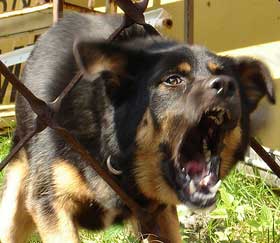About The Most Frequent Barking Problems
 About the most frequent barking problems.
About the most frequent barking problems.
One of the most frequent complaints about canine behavior is barking. Aside from the behavior is barking dog is probably the pet peeve of many non-dog owners. Most dogs get noisy when exposed to anything new or unusual. Like most dog behavior, barking is typically a symptom of an unsatisfied need. Barking is simply a dog's means of communication, whether directed at other dogs, at members of the household, or at the world in general. It may be an attempt to stake out territory, or warn owners of intruders. Since dogs are social animals, it could be a symptom of loneliness and attempt to get attention- announcing to the unseen, but very audible early morning chorus of his peers that, "Yeah, I'm here, too." A lack of exercise and interaction with humans, or other dogs, may produce barking, as will boredom when left alone indoors for extended periods of time. If your neighbors complain about your dog barking while you are not at home, first purchase a voice-activated tape recorder and set it up where your dog will trigger the tape if it barks. You may find that your neighbor is incorrect about how much your dog actually does bark (keep a log of the barking you record). You may find out what exactly causes it to bark (hearing a car drive by before each barking sequence, for example), giving you some ideas for eliminating the behavior. But do determine that there is actually a problem before you try to do something about it. If you know that you have a problem, you might enlist the help of your neighbors. Neighbors are often happy to help you with this problem! Have them squirt water at excessive barking, or rattle cans of pennies/rocks, etc. In any event, take a neighbor's complaint seriously, even if it is unwarranted. More neighbor disputes arise over barking dogs than anything else, and dogs have been injured or killed by neighbors desperate for a good nights sleep. Some dogs bark at everything they see and hear. Some dogs will stop barking if they cannot hear or see the interlopers. So, if dog is an in-the-house noisemaker, put her in the kitchen or laundry room with a crate or bed, away from windows, common walls, and hallways, and turn on a radio before leaving the house. Classical music stations may work best; they have fewer disruptions by commercials with doorbells and other noises that could trigger barking. Confine dog in the room with baby gates in the doorways, not by closing doors, so she doesn't panic. There is some evidence that barking is an inherited trait: if the parents bark a lot, chances are their puppies will, too. Often, one method that helps alleviate barking is to give your dog specific permission to bark. Teach it to "speak" -- let it "speak" when appropriate (say, when you're playing in the park). Then "no speak" follows from that. However, there is often a problem when the dog is alone. The following methods outline some other possibilities to address this problem. Training the dog to stop barking on command can be accomplished with lure-reward techniques, disruption techniques, or head halter and leash training. Training a dog to be quiet on command allows it to continue to bark at stimuli but stop at your request. Rewards are then given for quiet behavior. At each subsequent training session the dog should remain quiet a little longer before the reward is given. Teaching a dog to stop all barking in the presence of the stimulus is much more difficult. To be successful, barking must be interrupted immediately as it begins, and the process repeated until the dog does not bark at the stimulus (at which time it can be rewarded). Punishment is generally ineffective in the control and correction of barking problems. Excessive punishment can increase anxiety and further aggravate the problem, while insufficient punishment merely rewards the behavior by providing attention. For punishment to be effective, barking must be disrupted at the instant it begins, using a technique or device that effectively interrupts the barking. When you are not present as barking begins, the only solution might be to use bark-activated products
Source: Askedweb Information portal
0 comments:
Post a Comment